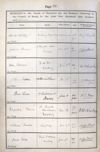WILLIAM BOUCHER
A WAITER FOUND DEAD AT NEWBURY
On Monday evening Dr. Henry Watson held an inquest, in the Magistrates’ Room, on the body of William Boucher, who was found dead on Saturday, in the outhouse adjoining the pavilion in the Cricket ground. The deceased man was a widower, and was well known in the town for a number of years as a waiter, and was engaged at most at public functions. Latterly he has walked the streets in dirty and unkempt state. His body when found was stated to be in very dirty and verminous condition. He was formerly butler in good families and was 58 years of age.
The following evidence was given.
Beniamin Boucher, a stonemason, of Speenhamland, said : I identify the body of the deceased as my brother. I last saw him alive three weeks last Saturday, He was a widower. He formerly lived with me for eight years. Latterly be was employed by Mrs Stilwell. I am not sure where be has been living for some months. Lately he had been waiting and acting as a barman.
P.a. Mansbridge: He has been of no occupation for the past two years.
Witness: He was idle. He was never quite destitute. He formerlv was butler to several ladies and had a lump sum from them. He has been going down a long time. He lived with me eight years but never came home tipsy. He left me because of his idle habits, we could not put up with him.
P.s. Mansbridge: He has slept “rough" for a long time.
Albert Lovelock, bricklayer, of Northbrook Place, said: On Saturday afternoon about 3 o'clock I was going down to see the football match ; and just before I got to the pavilion I noticed something in the open shed. It was the body of the deceased. The deceased was lying at length on his left side.
P.s. Mansbridge stated: I was called to the cricket field. The deceased's trousers were torn. He had no shirt on. His body was covered with a waistcoat and coat. The coat was torn and the boots were on. His hat was under the body. There were no marks of any struggle, and no blood. With the assistance of 1st witness and two other men I took the body to the mortuary. I searched him and found a female's gold brooch, three gold pins, a gold ring and silver watch, timed ten minutes to four. He was covered with vermin and in a bad state altogether. When he was removed from the '*Dolphin" the police removed him (sic.). The police knew that he had slept out “rough" for two years. He was cautioned but would not go into the Union. Witness spoke to the deceased on Thursday. One of the pins was identified by Mrs Stilwell, of the “Dolphin," and it was valued at 55s. It formerly belonged to her late husband. She had missed it.
Benjamin Boucher said the watch was his brothers and he had pins which had been given him by his fellow servants.
P.s. Mansbridge asked for an order to keep the jewellery for a certain time. There was only one halfpenny found on him.
The Coroner observed that although identified by Mrs Stilwell, perhaps it was premature to have given it up before the inquest.
Dr. Richard Hickman stated that by order of the Coroner he examined the deceased. The body was fairly well nourished, quite limp and he had evidently been dead a couple of days. There were no marks of violence or bruises whatever; nothing externally to show the cause of death. He professionally attended him some years ago. He was a very “drunken chap" he should think. There was no distortion of the features.
The Coroner: No bottle was found the shed? Mansbridge; No.
Dr. Hickman: I should think he died from heart disease or apoplectic fit, which I cannot say. I should rather think heart disease. There was no evidence of suicide.
The Coroner: I did not order a post mortum examination.
Dr. Hickman: I am perfectly certain that death did not result from foul play. It must have been some internal cause and without violence and accelerated by cold and exposure.
The jury came to the conclusion that death was from heart disease accelerated by cold. They also wished to add that the giving up of the pin to Mrs. Stilwell was irregular, in that it might have been given to the deceased by the late Mr. Stilwell. Otherwise it pointed to theft of which there was no proof and the man could not now answer for himself.
P.s. Mansbridge further said that the late Mr. Stilwell missed the pin before his death and thought it was fair to give it up; at all events he obeyed the instructions of his superintendent.
A Juryman: That statement quite alters the case at once.



